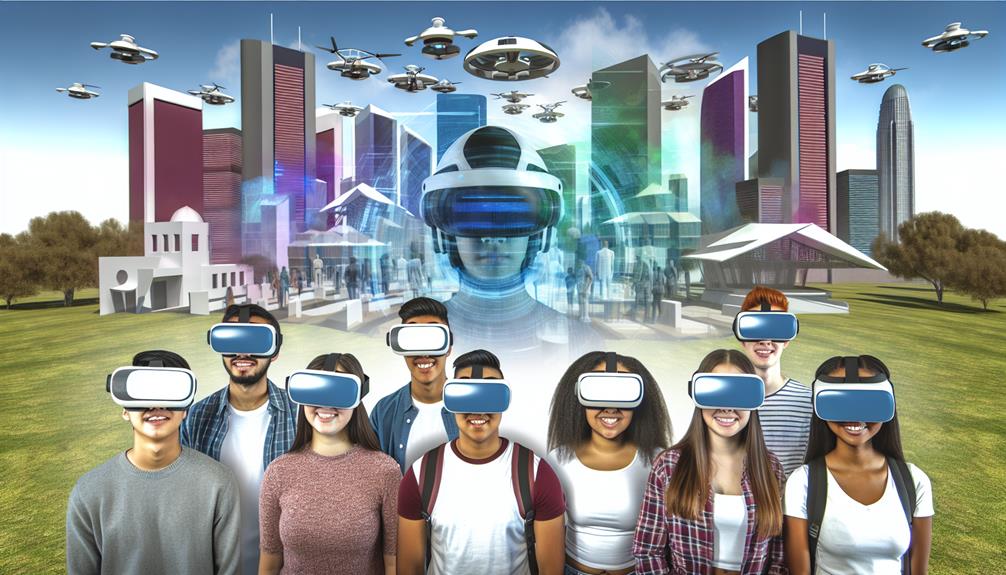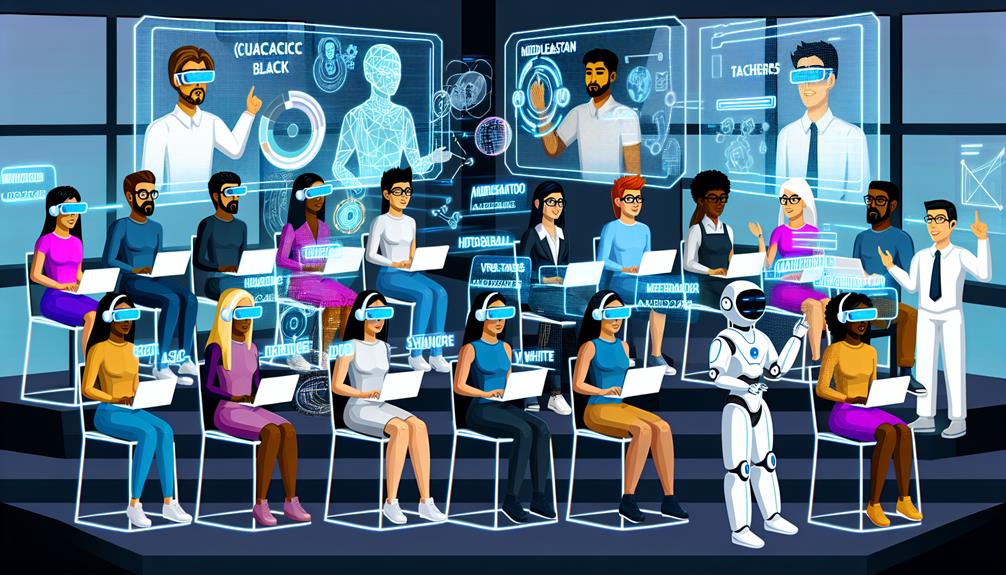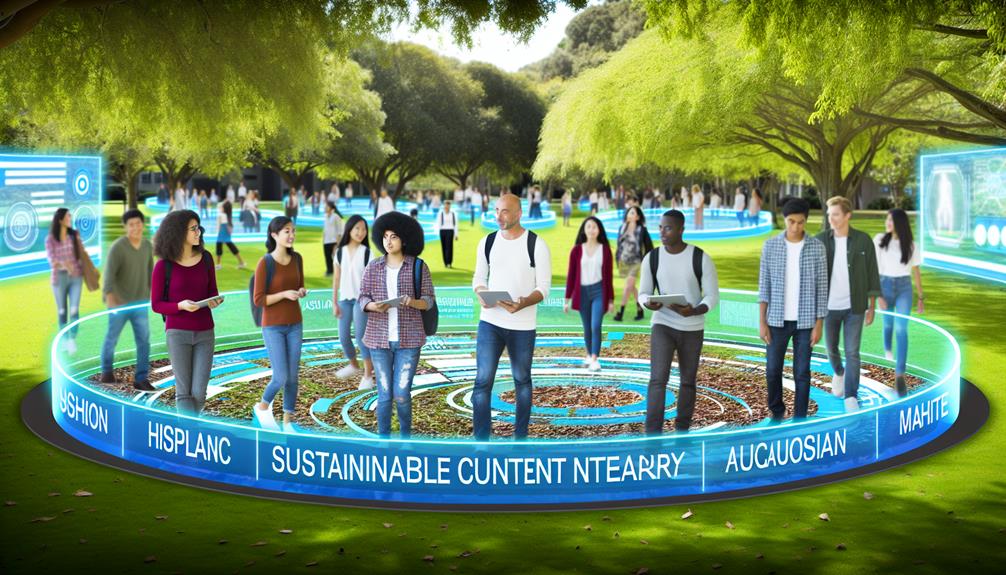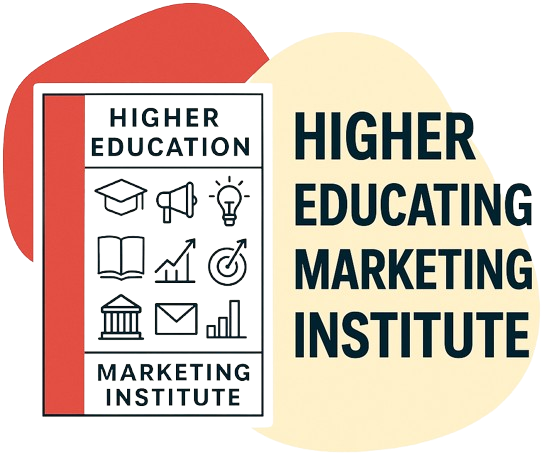Did you know that by the end of 2024, 80% of higher education institutions are expected to use some form of content marketing in their communication strategies?
You're probably wondering what's driving this dramatic shift. Well, as the digital landscape continues to expand and evolve, universities and colleges are recognizing the immense potential of content marketing to attract, engage, and retain students.
But with such a diverse range of techniques and technologies available, it's crucial to understand what's truly making an impact.
So, let's explore the content marketing trends that are setting successful higher education institutions apart this year.
Key Takeaways
- Virtual campus tours and immersive experiences are reshaping higher education content marketing, providing convenience, personalization, and high engagement.
- Artificial Intelligence is being used to deliver personalized content, adapting the learning path based on individual needs and analyzing performance to provide personalized study materials.
- Influencer partnerships and user-generated content are effective strategies in reaching prospective students, with transparency and ethical considerations being crucial in forming partnerships and measuring impact.
- Podcasting is a powerful tool in academia, offering remote learning, flexibility, and fostering a sense of community through shared interests and discussions.
The Rise of Virtual Campus Tours

You're seeing a surge in virtual campus tours, a trend that's reshaping the landscape of higher education content marketing. This shift is due to Virtual Reality Integration and Augmented Reality Exploration, pushing the boundaries of traditional campus tours.
Imagine stepping into your prospective university's campus, feeling the buzz of student life, the grandeur of the architecture, all without leaving your living room. That's the power of Virtual Reality Integration. It's not just a 360-degree video anymore; it's an immersive experience. You're not just observing; you're participating.
Now, let's take it a step further with Augmented Reality Exploration. This technology enhances your virtual tour by superimposing digital information—like interactive maps, videos of student testimonials, or real-time chats with admissions officers—onto your view of the virtual campus. It's like having a personal guide in your pocket.
These virtual tours offer you convenience, personalization, and a level of engagement that's hard to beat. You're not just looking at a university—you're experiencing it.
Embracing AI for Personalized Content
In the realm of higher education marketing, an increasing number of institutions are harnessing the power of Artificial Intelligence to deliver personalized content. This isn't just a futuristic concept, it's a reality you're part of today. AI is helping to reshape the way educational content is developed and delivered, making your learning experience more tailored and engaging.
One key area where AI shines is in curriculum design. AI-driven curriculum design allows institutions to adapt the learning path based on your unique needs and pace. It's no longer one-size-fits-all, but a customized journey that respects your learning style and propels you towards your academic goals.
Personalized study materials are another game-changer in higher education. AI can analyze your performance and learning habits, and then provide study materials that are right for you. It means you're spending less time on topics you've mastered and more time on areas that need work.
Embracing AI for personalized content is more than a trend. It's a shift that's enhancing the learning experience, making education more accessible, and setting the stage for your success. It's time to welcome this change and reap the benefits.
Influencer Partnerships in Education

While AI's personalization of content is revolutionizing learning, there's another trend making waves in higher education marketing: influencer partnerships. You see, universities aren't just relying on traditional advertising anymore. They're leveraging the power of social media influencers, especially those with a strong academic standing, to reach prospective students.
But, as with any marketing strategy, it's crucial to consider academic influencer ethics. This means ensuring that partnerships are transparent and the content influencers share is honest and beneficial to their audience. You can't overlook the responsibility influencers have to their followers.
However, ethics alone isn't enough. You also need to measure the impact of influencer partnerships. That's where influencer impact measurement comes in. By tracking metrics like engagement rates, audience growth, and conversion rates, you can gauge the effectiveness of your influencer partnerships.
In a nutshell, influencer partnerships are a powerful tool in higher education marketing. But remember, it's not about just selecting someone with the most followers. Prioritize influencers who align with your institution's values and have an audience that matches your target demographic.
The Power of Podcasting in Academia
Shifting gears, let's delve into the rising trend of podcasting in academia and how it's shaping the future of educational content.
Podcasting isn't just a fad; it's a powerful tool that's transforming the way we learn and engage with academic content.
There are numerous Academic Podcasting Benefits, such as:
- It allows for remote learning, making education accessible to anyone with an internet connection.
- Podcasts offer flexibility – you can listen anytime, anywhere.
- It caters to diverse learning styles, particularly auditory learners.
- It fosters a sense of community through shared interests and discussions.
But it's not all smooth sailing. You'll face Podcast Production Challenges, which include technical difficulties, ensuring high-quality content, keeping the audience engaged, and updating content regularly.
Despite these challenges, the benefits outweigh the drawbacks.
Interactive Learning Experiences Online

You'll find that online education has revolutionized traditional learning methods, offering countless interactive experiences designed to keep you engaged and actively involved in your learning process. Gamified education is one such trend, which uses game mechanics to foster learning, drive competition, and reward progress. It's a smart way to make learning fun, interactive, and more effective.
In the same vein, immersive tech ed is transforming the online learning landscape. Virtual reality (VR), augmented reality (AR), and mixed reality (MR) are providing immersive learning experiences that just weren't possible with traditional teaching methods. You're not just sitting and watching, you're actively participating, exploring, and learning in a simulated environment.
With these advancements, you're no longer a passive recipient but an active participant in your learning process. The focus is on creating engaging, personalized experiences that cater to your learning style and pace. These interactive learning experiences online aren't just about consuming content; they're about exploring, experimenting, and learning in ways you never have before.
The future of online education lies in these ed-tech innovations, pushing the boundaries and redefining what's possible in learning.
User-Generated Content as a Tool
Diving into the realm of user-generated content, it becomes clear that it's a powerful tool in the content marketing landscape of higher education. We're talking about content created by your students, faculty, and alumni. This content is authentic, relatable, and often more persuasive than professionally produced materials.
UGC metrics analysis helps you understand what content resonates with your audience. By tracking likes, shares, comments, and other engagement metrics, you can identify successful content types and themes. Additionally, peer-created syllabi offer a unique way to engage students. They enable students to learn from their peers, fostering a sense of community and collaboration.
User-generated content isn't just beneficial; it's essential. Here's why:
- It offers a fresh perspective in an authentic voice.
- It encourages active involvement from students, faculty, and alumni.
- UGC metrics analysis provides valuable insights into audience preferences.
- Peer-created syllabi promote student engagement and collaborative learning.
Sustainable Content Marketing Practices

As we move forward, let's explore five key strategies for building sustainable content marketing practices in higher education.
Firstly, incorporate green storytelling into your content strategy. This means sharing your institution's sustainability efforts and victories. Your audience will appreciate your commitment to the environment, and it's a great way to differentiate your institution.
Secondly, run eco-conscious campaigns. Use your platforms to promote environmental awareness and initiatives. This could include a campaign to reduce energy usage on campus, or highlighting research into sustainable technologies.
The third strategy is to use sustainable design principles in your content creation. This could mean using eco-friendly materials for physical marketing materials, or optimizing your digital content to reduce energy consumption.
Fourth, engage your audience in your sustainability efforts. Encourage student and staff involvement in green initiatives, and share their stories in your content.
Lastly, continually assess and improve upon your sustainability practices. As with any aspect of content marketing, it's essential to analyze your efforts, learn from your successes and failures, and make ongoing improvements. In doing so, you'll ensure that your content marketing isn't just effective, but also sustainable.
Conclusion
So, you've seen the future of content marketing in higher education. From virtual campus tours like those at Harvard, to AI personalization techniques that feel like magic, and even to the unexpected rise of academic podcasts. Higher ed is embracing these trends, and it's time for you to jump on board.
Remember, it's about making content that connects, educates, and inspires. So, why not start a sustainability blog or partner with an influencer? The possibilities are endless!



